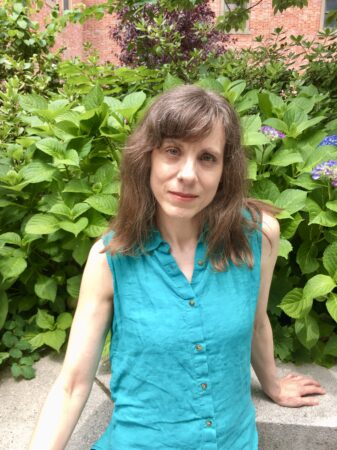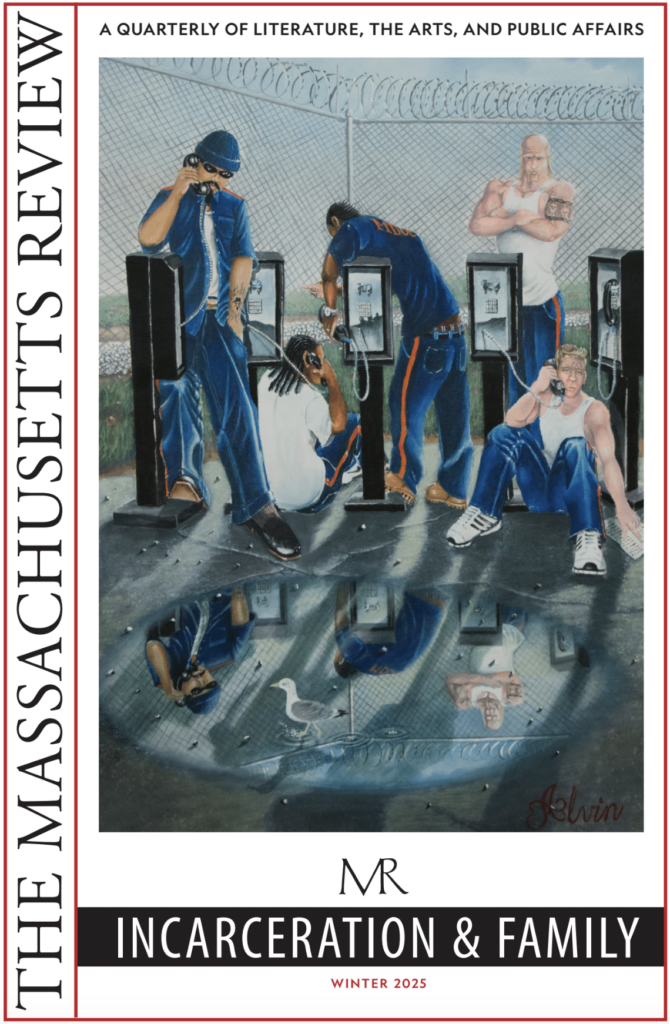10 Questions for Mary Byrne

I was sorry to bother her. I was always sorry to lift my hand, make the fist, knock, knock. Always at the dinner hour, that’s when you caught them at home. But isn’t it odd—I never interrupted anyone’s dinner, not in all my years of knock, knock. People would come to the door. They would look me up and down, the rank stranger behind their screen. Six o’clock and what I had interrupted was not dinner. When did people eat anymore? Young, old, rich, poor, Baptist, Presbyterian, Assembly of God—what I interrupted was not dinner.
—from Mary Byrne’s “In A Gracious Land,” Volume 66 Issue 2 (Summer 2025)
Tell us about one of the first pieces you wrote.
The first pieces I wrote were songs, starting with words, with music to come later. I’d go somewhere with a lot of people coming and going, some restaurant or cafe, order many cups of coffee, and somehow the buzz of human activity and caffeine would swirl around and eventually narrow in on the thing I needed to write about that day. This was Atlanta, so it was usually hot inside, with ceiling fans twirling overhead, and outside, the heat would just blast you. There was a lot of music all around, everywhere. I felt I was just writing my way into the mix.
What writer(s) or works have influenced the way you write now?
Whomever I’ve read most recently is having an influence on what I’m writing. Maybe I wish I could say that I draw a line of inspiration from the work of someone specific, but I think I’m more susceptible and indiscriminate than that. I tend to find something really helpful for my writing in pretty much any book that I read.
What other professions have you worked in?
I’ve worked as a lifeguard, call center representative, waitress, copy editor, proofreader, freelance journalist, and teacher.
What inspired you to write this piece?
I wrote “In a Gracious Land” in response to a challenge to write a story from two points of view. I began with the door-knocker, whose agenda and perspective are one thing, then switched to the door-answerer, for whom it’s quite different. Eventually, as I wrote and revised the story, I got interested in the way people spoke and the rhythms of their speech, as well as the uneasy disjuncture between the straight lines of the law, of what is considered right and wrong, versus the hazier realms of lived experience.
Is there a city or place, real or imagined, that influences your writing?
A lot of my writing has been set in Atlanta in the late 1990s and early 2000s, maybe because of what I experienced as a particular intensity to the time and place and an especially strong resonance to my memories of it now. Sometimes it feels like I’ll never run out of things to say about that time and place. Then I think, well, the world is a big place, and Atlanta’s not the only place I’ve lived, so … But I’m still writing about it.
Is there any specific music that aids you through the writing or editing process?
Music, any overhead music, used to be helpful when I was writing words for songs. But these days, for prose, the quieter the better. Earplugs help in New York.
Do you have any rituals or traditions that you do in order to write?
I don’t have rituals or traditions that I can think of. Mainly it is a matter of planning ahead and setting a schedule. This means ruthlessly clearing out other things in advance — any other obligations and tasks I need to attend to, they get done and done, they get crossed off the list, bye-bye — so that the writing time is protected and kept intact.
Who typically gets the first read of your work?
I give my work my husband Mark Rogers, only after I’ve revised it many times and thought about it for a long time. He is an astute reader with excellent taste. What he says tends to be spot-on, like turning a key in a lock, often helping me see how to solve something that’s dogged me all along.
If you could work in another art form what would it be?
I was in music for years with several projects in Atlanta, and in New York with Mark. So I did and love that art form very much. The experience of making records in a studio was a mixture of heady bliss and almost unbearable intensity; I don’t think there’s any better kind of work.
What are you working on currently?
I’m working on a piece set in Georgia and Alabama in the early 2000s that might be longer and involve more characters than it seems a short story should. I’ll know if it’s not really a short story once I’ve gotten further along. At this point it looks long.
MARY BYRNE’s fiction has appeared in Epiphany, the Carolina Quarterly, and the Under Review.



